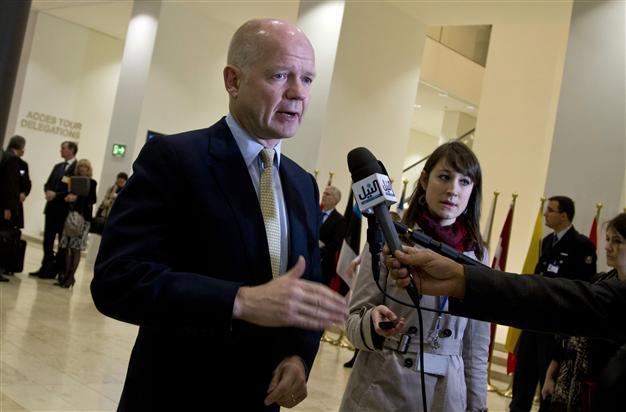EU agrees on wider Iran sanctions, Ashton sees more talks soon
LUXEMBOURG - Reuters

Foreign Minister William Hague speaks with the media as he arrives for a meeting of EU Foreign Ministers in Luxembourg on Monday Oct. 15, 2012. AP photo
European Union governments agreed further sanctions against Iran's banking, shipping and industrial sectors on Monday, cranking up financial pressure on Tehran in the hope of drawing it into serious negotiations on its nuclear programme.
The decision by EU foreign ministers reflected mounting concerns over Iran's nuclear intentions and Israeli threats to attack Iranian atomic installations if a mix of sanctions and diplomacy proves fruitless in ushering in a peaceful solution.
EU foreign policy chief Catherine Ashton said she hoped that turning up the heat on the Islamic Republic would persuade it to make concessions and that negotiations could resume "very soon".
"I absolutely do think there is room for negotiations," said Ashton, who represents the United States, China, Russia, Britain, France and Germany in their on-and-off talks with Iran. "I hope we will be able to make progress very soon."
The new sanctions mark one of the toughest moves against Iran by Europe to date and a significant change of policy for the 27-member bloc, which hitherto focused on targeting specific people and companies with economic restrictions.
The EU has lagged the United States in imposing blanket industry bans because it is concerned not to punish ordinary Iranian citizens while inflicting pain on the Tehran government.
Iran maintains that its nuclear project has only peaceful energy purposes and has refused in three rounds of talks since April to scale back its uranium enrichment activity unless major economic sanctions are rescinded.
But governments in Europe and the United States, doubting Iran's preparedness for more than dilatory "talks about talks", are instead tightening the financial screws on Tehran and fears of a descent into a new Middle East war are growing.
German Foreign Minister Guido Westerwelle was more pessimistic than Ashton about the prospect that additional economic pain might drive Tehran - whose Islamic Revolution has long thrived on defiance of the West - to make concessions.
"Iran is still playing for time," he told reporters. "We don't see a sufficient readiness for substantial talks about the nuclear programme."
Ratcheting up pressureThe widening sanctions regime is already doing significant damage to the Iranian economy, notably due to an oil embargo imposed by the European Union this year and new financial sanctions applied by the United States.
Earlier this month, riots broke out in Tehran in protest at the collapse of the rial currency, which has lost some two-thirds of its value against the dollar in the past 15 months, stoking inflation that is now running at around 25 percent.
The new European measures include a general ban on financial transactions, with some exceptions for those involving humanitarian aid, food and medicine purchases and provisions for legitimate trade, an EU diplomat said.
In a reversal of existing European policy, the ban will require European traders to apply to their governments for authorisation before they can finance any transactions in permitted goods. Previously, the EU's more narrow approach was to allow trade broadly while prohibiting specific products.
Trade will be hampered further by a new ban on European governments extending short-term trade guarantees.
Ashton last met Iran's chief negotiator Saeed Jalili in Istanbul in September for a session that her spokesman described as "useful and constructive".
At the core of Iran's dispute with world powers is its insistence on the right to enrich uranium and that economic sanctions should be lifted before it stops activities that could lead to its achieving the capability to produce nuclear weapons.
The United States and European allies say Iran forfeited a right to enrich by having concealed sensitive nuclear work from U.N. inspectors and stonewalling their long-running inquiry into suspected bomb research by Tehran.
They also believe that dropping sanctions first would remove any incentive for Iran to open up to inspectors and pursue a negotiated settlement.
